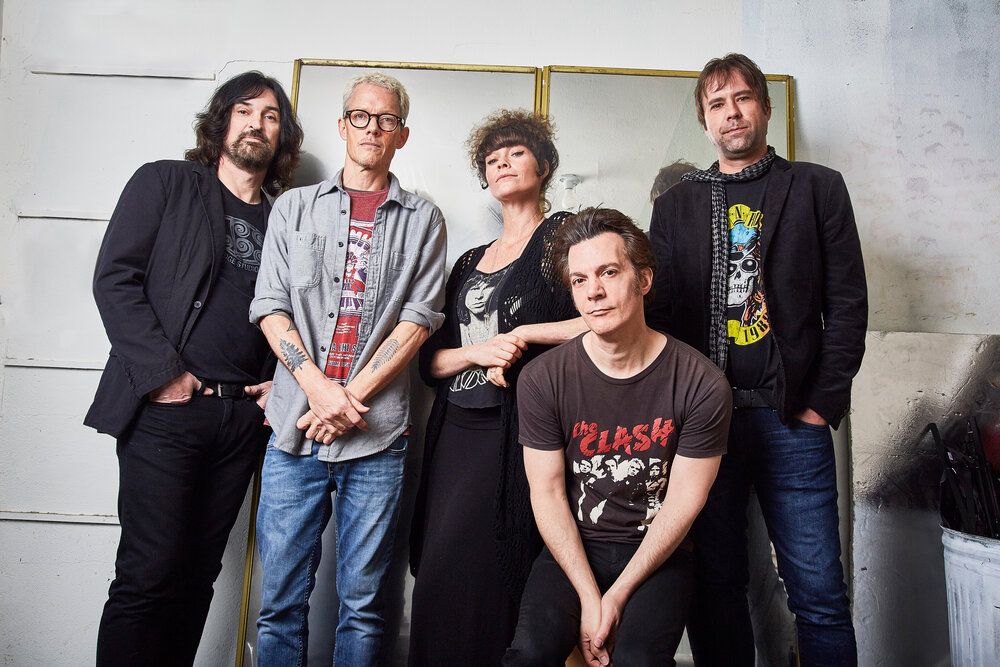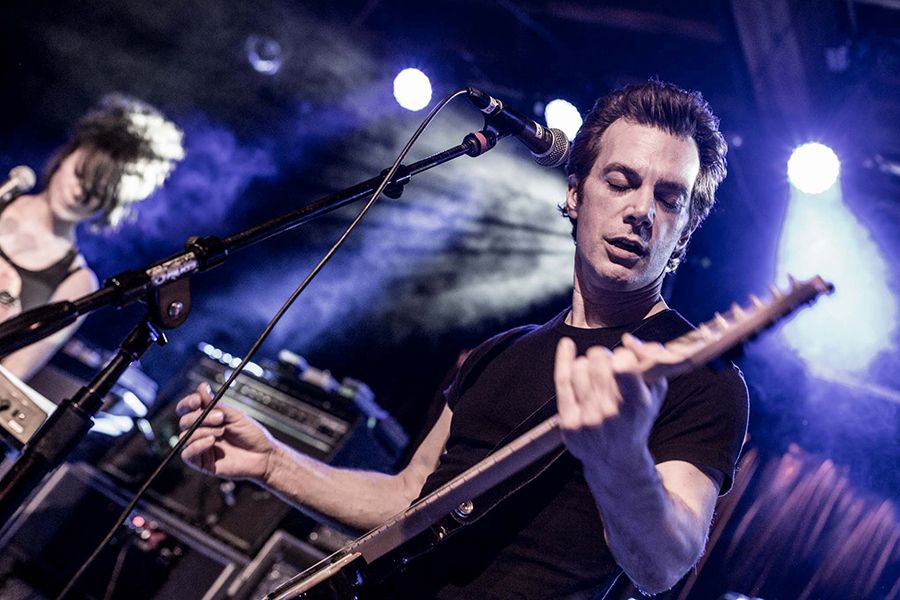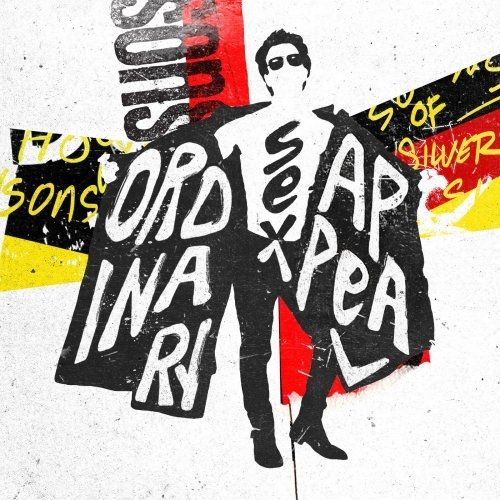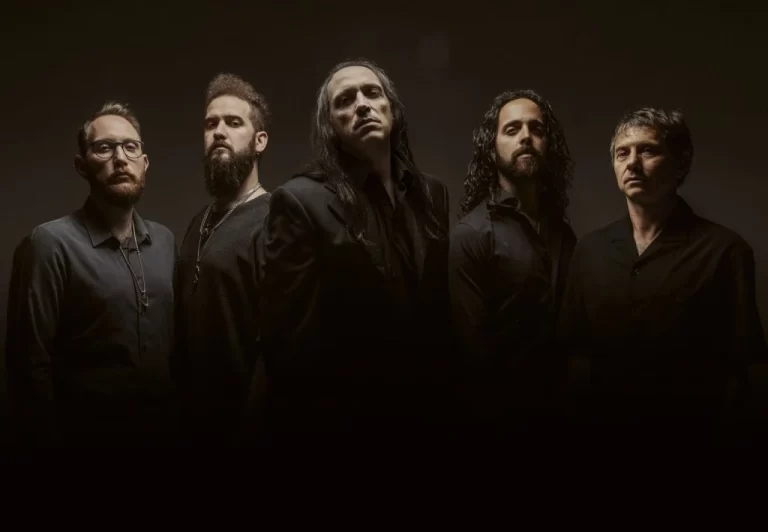The last time I met with Sons of Silver, it was during the various lockdowns of 2020 and the band had just released the still-amazing Doomsday Noises EP. The band, which comprises Peter Argyropoulos, Kevin Haaland (Skillet), Adam Kury (Candlebox), Dave Krusen (ex-Pearl Jam) and Brina Kabler, are a tight-knit unit who compliment each other both musically and personally and, for that interview, the entire band sat in, taking it in turns to answer my questions.
This time around, and in the wake of the equally brilliant Ordinary Sex Appeal, I find Pete, Adam and Kevin gathered around their webcams to discuss their progress since the world started to turn upon its axis once more. Certainly, there’s been a lot happening in the SoS camp: Pete and Brina had a son, meaning that John Fields (Soul Asylum) was brought in to conclude OSA; the band have hit the road, releasing a number of cracking live videos along the way, and they’re in the studio now working their way towards their debut full-length. Speaking for myself, and (no doubt) for the countless Sons of Silver fans out there, the full-length cannot come soon enough, and it’s clearly an exciting time for the band.

We met briefly via zoom once before, during the lockdown, and it’s great to see you again. Congratulations, first of all, on having a son, and on getting a new EP done in the interim. I know I came late to the party in reviewing Ordinary Sex Appeal, but it’s a great EP and it’s really cool to have the chance to catch up with you and see how things have been going.
Pete: Thank you for the time and for the write up – it was a real compliment, so thank you.
A pleasure. So, the first question I have is that you did everything in-house with Doomsday Noises, but with Brina on Maternity leave, I think she engineered the sessions, and then you got John Fields to come in, so how did you settle on a producer and how was it to go outside of the band, which must have been a bit of a jump?
Kevin: Really, he just mixed, so really all the production stuff was in house. It was more of a mix with John.
Pete: Yeah, that’s it. Brina tracked everything laid everything out and did really, very thorough rough mixes for him, to the point where he was a little peeved at first (and I can say this, hopefully, because we’ve become friends since then). He Was like “hey, you’re tying my hands a bit here” and we were like “if you don’t want to do the gig…” But he willingly did, and he helped take the songs to the next level with the Ordinary Sex Appeal EP, sand it was great. It was great to bring him on board, but otherwise it was just the five of us producing and Brina engineering. We keep it pretty low key as far as the people involved.
Doing it that way, was it done remotely, firing mixes back and forth?
Pete: It was all remote. He lives in Minneapolis, we’re here in Los Angeles, so it’s not like anyone… it’s not like you need to be running off to the studio. It has its conveniences, but it’s not necessary.
Kevin: I think mixing is a solitary thing, too. You know. You might want to be alone for that.
My experiences of mixing remotely is that you usually get something you’re pretty happy with and then comes that very fiddly bit, where you’re kind of getting super detailed in the notes – was there any of that?
Pete: Oh yeah! [[Laughs] Actually, it’s funny, because the very first song he mixed for the EP was the song “With You,” which is the most complex song to mix form that EP with regards the layers. In general there aren’t too many layers in our songs, but there were in that one, and we didn’t know what to expect. But my thinking was: give him the toughest one and, if he can crack that one, we’re sorted. And he actually nailed it on the first shot. We had a couple of little tweaks after, but I remember that we passed it around and we were like “wow! OK, cool!”
Mind you, Brina had done a lot of heavy lifting as far as where things were panned and levels. I think he even said “I didn’t touch the guitars or keys at all, the vocal barely at all…” So, it was straightforward, but the next song (which we thought would be easier), I don’t remember which one it was, but at one point he came back and said “I can’t do this, guys, you’re firing too many notes back at me”. So, I had to get on the phone with him, like “hey dude, we can do this”, just bring him back in. And he really rose to the occasion, and it was pretty smooth sailing form thereon out. And I was really happy, because one of the toughest things is getting the low end right. He just nails the low end and I remember Adam was really happy about that, and that made me happy, because I like to make Adam happy.
Adam: Well, I mean – overall balance. And it is true, because I mix as well and the low end is the most challenging thing because a lot of low end frequencies do not play well together. When you carve out space for high end stuff, you have a lot more room to move things around and not have things compete. But low end is… it can become a big mud fest where you can’t here anything real fast.
Pete: Yeah, absolutely.
Pete: And, in all fairness, when we’re recording – well, writing / recording, it kinda happens at the same time for us – our first attention is on the song as far as the melody and lyrics and guitars and drums. I think, sometimes, because Adam comes up with great lines, right off the bat, we overlook the bass and we don’t pay enough attention to the tone and where it sits in the mix. So, it’s not necessarily that we have to go and repair things in the mix, but it’s just you know, wee have to be like: “hey, this child needs some love as well!” So, I think there’s a bit of that. But John does a great job and that’s one of the things that John brought to the mixing – he has a really strong pop sensibility, and he creates these really punchy mixes and I’d say that for all of us, we’re all a little left of centre in our thinking. Maybe not the same left of centre, but we are left of centre, so maybe cumulatively we’re a little too left of centre, so he can pull us back and that’s a nice balance to have.
Kevin: He layers all the instruments really well, he mixes really well, we’re lucky to have him involved for sure.

When I spoke to you last, you’d actually tracked at least some of the EP, and you were working on lyrics at the time, and there was a slightly… anxious edge to the lyrics, both for Doomsday Noises and Ordinary Sex Appeal, and a lot’s changed since then: the world’s coming out of lockdown and you’ve had a child in the interim, so I was wondering if you’d found your lyrical focus shift as you start writing for the album?
Peter: The album that we’re in the middle of working on… I thought it would have. Huh! The intention was there on my part, but no it’s taken a pretty hard-nosed approach. In some ways harder nosed. It’s interesting with his one because the way we’re working on the album (which doesn’t have a title), these songs came about a bit differently. There was a lot more involvement… I don’t even know; it was just a slightly different process. There was a lot of jamming, which we pulled grooves from that I’d take and work with. But, at the same time, Kevin, Adam and I were just sat in a room for a few days, just with a drum machine, really fine tuning melodies and structures of songs and, in the meantime, while I’m always firing out lyrical ideas, as we’re developing songs, be it with the full band or just refining a vocal, there’s a lot more involvement in people pointing out what they like or don’t like. Even now, in the last few weeks here, it’s just been primarily myself, Kevin and Brina in the studios – they have had a lot more input in the lyrics, and that’s maybe helped me form going off the deep end with some lyrical ideas, it’s also… I’m a contrarian so… I’m answering your question in a really political way… but the point is, it still has an edge. Things have changed. There’s maybe more sentimentality involved, because I’ve got a kid now, but I’m still kind of pisssed off about some stuff. But these guys all get to stamp their approval. I would never say something and I’d never go on stage and rant about anything that would make anyone even remotely uncomfortable, so… But I do talk about… there’s a song about Adam being in his underwear, so…
Adam: That makes me uncomfortable.
It makes me wonder… you’re sat quite low, so it makes me wonder if you’re wearing trousers under there, or if you one of those people who just dresses the top half in zoom calls.
Adam: [Stands up] Here’s the reveal – fully clothed.
[Peter & Kevin both groan]
I’m strangely disappointed.
Adam: We’ll save that for the next interview. If we get this record to be whatever the equivalent of gold or platinum is these days, however they figure that, I’ll come on in the underwear. It’ll be 100% We’ll do the interview; I won’t even sit under the desk if anyone requests it. But! It’s got to be gold or platinum.
Pete: I look forward to that.
That’s going to be a lot of interviews, where you’ll be looking at a lot of… junk
Adam: No, just my junk.
Pete: It’s not a lot of junk, just a little bit.
I sort of bugged you about this last time, and it’s my kind of geeky interest, but when you sequence an EP, it’s a kind of smash’n’grab, where you have to hold the interest over three or four songs, but really the focus is on grabbing the listener tight. An album, I guess, is more of a journey, further complicated if you’re thinking in terms of vinyl or CD as a primary format. Now that you’re focusing on the album, are you trying to build that sense as you go along, or is it something that you’re waiting until you have all the songs more or less written?
Pete: Good question – do you want to take that one, Adam?
Adam: Well, I think that… just like the EP, you’re looking for groups of songs that play well together, that have some sort of continuity together, although not necessarily the same. We’re not making like a concept album or anything.
Pete: Well, the last time you were here in the studio we weren’t…
Kevin: yeah, right?!
Adam: But, in my mind, I don’t look at things that way until you’re assembling the final product one song at a time and then you turn around and, I’m notorious for it, because I’m not in the studio as often, so I come back and I’m like “wait, what songs do we have?” Like, I don’t even keep track of it, so it’s… yeah, you look for songs that work together. Sometimes you have one you really like, and it just doesn’t go, so you save it for something else.
Pete: Yeah, I’ll add to that. We have a batch of songs, we have a batch of songs we began with the intent that they’ll all fit together well, but there’ll almost certainly be a couple that get left to the wayside. We’re shooting for around thirty to thirty-five minutes’ worth of music, so we’ll have about forty-five to fifty-minutes’ worth of music that we’re working on right now. As far as concept, no. It’s like Adam said – it’ll be which songs fit together the best and have the best flow. Obviously, we’re going to make sure we highlight, or we surround the best songs with the ones that are the most suitable, but.. the only thing I’ll add is that we spent a little time (Brina, Kevin and I) what could, perhaps, be segues coming in and out of these different songs and those are segues that are easily removed from the song in the mix, so if we don’t want to use them or have too many… it’s one of those things where we plan to sit down and listen to the mixes, or stuff that’s fairly well mixed, in a few weeks from now and figure out which songs we like the best, which elements we need to change (for example redo the guitars or re-sing a vocal) and just sort of narrow the focus down and put the ones that fit best together. Who knows, we may end up deciding we only like five or six songs and putting out another EP!
I like the segue thing – the only problem with segues now is that, with streaming services, you either get very strange cut offs, or you get thirty-second tracks confusing the hell out of listeners! In terms of making records flow, I think it’s a bit of a dying art and it’s nice to hear bands experimenting with that sort of stuff.
Adam: To me, when you talk about that, and that’s a good concept – you have to be aware of the format people are dealing with. Like you said, if you’re producing vinyl, that’s great because people are more or less going to put a needle on and listen all the way through, and even with a CD. But nowadays, people do singles and I almost feel like you do a single mix without the segues and then, if you are going to do a digital release, you can that think like Prince – there’s another artist that did it – where there are no track markers…
Kevin: Oh really? I didn’t hear that…
Adam: Yeah, Prince did that for (I think) the Black Album – there are no track markers. Or maybe it was the one before… but if you do that if you want the segues, or you just do the singles. I think also, for fans, getting different versions or different things. For example, maybe there’s different mixing or if you do a remix on something and pull up the rhythm section and add acoustic guitars… I think there are a lot of ways you can treat things and I think that’s the interesting thing in the world we live in. It’s not like the old days when you were pressing vinyl and you had to press different vinyl versions and you were making CDs. You can upload as many digital versions as you want and you’re not manufacturing any product, so you have that room because you’re literally just uploading files from the server.
Pete: Yeah, 100% and I’ll add to that. Maybe for vinyl, you have an extra track that might go on a vinyl release, or an extra couple of tracks that are exclusive to vinyl or a CD. Just different ways of presenting it. And, like Adam said, it’s sort of… not necessarily defined, but whatever the media or medium is sets the standard or narrows the scope of what you put out there.
Thinking of putting material out there – seeing the live video series you’ve done, because obviously we’ve not seen you over here yet, have you got any plans to do a long form live release – or – any plans to tour further afield?
Kevin: We definitely want to tour.
Pete: The plan is to tour and to tour a lot in support of this album and, if we do that, I am sure we’ll bring a live recording rig and we’ll record many, if not all of our shows and then have a wealth of material to choose from for a live release. That would be great. That’s my favourite and even last night when I went home… for whatever reason, the last few days I’ve been on a Depeche Mode kick and I’ve never been a huge Depeche Mode fan; not that I don’t like them, but last night I just found myself wanting to watch their live performances, which I thought were pretty stellar. Better than the recorded version of the songs, so I hope we can achieve the same.
I love it when you get bands that do things live a bit differently. And you’re right, with Depeche Mode, when they did the shows for Ultra and Songs of Faith and Devotion particularly, they had the live drums and it’s a whole different beast to what it is on record – I like that a lot.
Kevin: That’s my favourite Depeche Mode record – Ultra
Pete: Amazing album.
Kevin: Probably because there are more guitars on it, to be fair, but I love that record.
You also did a lyric video, and I’m always curious about this because the concept of lyric videos kind of appeared out of nowhere and now it’s basically expected that bands will do them – how do you feel about them? Are you fans, or is it something that has to happen?
Pete: Um, it’s a bit of both. It’s something that’s nice when it’s finished and it’s nice when you see it. It’s not necessarily the nicest thing to actually do, but it’s not the end of the world to shoot one or have one shot. It is a great tool to get stuff out there, particularly for us because our songs are very lyrically oriented, and the lyrics are very important to our style, so it’s nice to put them out there in that format because, in fact, the songs are somewhat wordy, so it’s a good opportunity for people to hit play – pause -play and figure out what I’m saying. As a fun fact, we’re working on right now for the song With You, and that should be out soon. So, yeah, I think it’s pretty cool. I don’t know what these guys think.
Adam: I think it’s essential.
Kevin: Yeah, it’s good.
Adam: Because so many people catch things on YouTube or places like that, so what are you going to do? Are you just going to put a recording with a picture of the album art and just run it? You want to do something creative and do a lyric video is a lot easier and a lot more cost effective than doing like a full video shoot. For that matter, I’d rather wait and see the band’s live video if I’m going to see a full video.
Pete: That’s a good point.
Adam: With the lyrics placed, you get a lot of the… we’ve gone to a lot of effort (Pete and Brina particularly) to take the album art concept and expand on those themes, so the videos tie together the records and the packages, so if you do it that way, then I think they’re great because the alternatives are, like I said, a full video shoot or just some random images while you’re listening to the song.
Pete: Yeah, and full video shoots are tough. It’s not just the time, the money, and the effort. You have to have a really good concept. You can have a million dollars and if you don’t have a good idea, you just threw away a million dollars.

The first EP had really cool cover art, which was almost like 50s and very stylised, and the same thing with the new EP, has this cool, Banksy-esque cover: so who did that, and what was the inspiration behind it?
Pete: For both of those, Brina was the main conceptualist and she worked with our graphic artist – a guy named Donny Philips – and really put it together and showed us and we gave our thumbs up / thumbs down and different ideas along the way. But, really, Brina was the one who led the way on it and, frankly, from my end I try to stay out of it because 1) just graphic arts are not my forte and 2) I tend to get a little aggravated with all this stuff and just be like “yeah, it’s good enough” so I can only give my thanks to both of them.
Thank you so much – it was great to see you and, hopefully, next time I’ll catch you around the release of your album!



